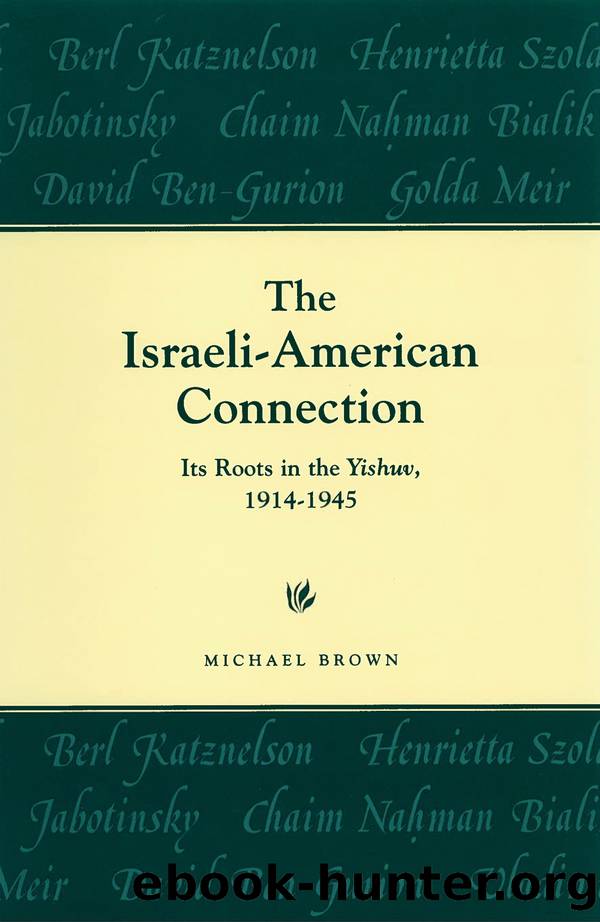The Israeli-American Connection by Brown Michael;

Author:Brown, Michael;
Language: eng
Format: epub
Publisher: Wayne State University Press
Published: 2017-06-12T00:00:00+00:00
Ben-Gurion as chairman of the Executive Committee of the Jewish Agency for Palestine, holding a press conference on the SS Berengaria on his return to America from the Zionist Congress in Geneva, 3 September 1937. (Courtesy of UPI-Bettmann.)
Although this war might be different, Ben-Gurion did not believe all the Zionist weapons of World War I to be antiquated. Like Jabotinsky, he wanted a Jewish fighting force to help defeat Hitler, to defend the national home, and to renew the claim for spoils, namely Palestine, after the war. Already in 1937, he had toyed with the notion of securing admission to West Point and Annapolis for future olim, ânot an easy thing for Jews,â but ânot out of the question with sufficient âpullâ (from senators and congressmen).â Training âofficers for Palestine at the expense of the American governmentâ had appeal to the cash-strapped Agency chairman; and he charged Benny Applebaum and another colleague with looking into the matter.173 It was not, however, a scheme that would appeal to Americans zealous for the good name of Zionism. Whatever their training, Ben-Gurion had âno doubt,â he reassured his son, Amos, in the same year, that in the case of war between Jews and Arabs âall of the younger generation in Poland, Rumania, America and other countries will flock to us.â174
After the failed St. James Conference, he returned to the army idea, informing Colonial Secretary Malcolm MacDonald that if Palestine Arabs could rely on reinforcements from Iraq, the Jews could summon their brethren from Poland and the United States.175 Here was his notion of American Jewry as a counterweight to the Arab states in a military context. Ben-Gurion conceived of the Jewish Army in two ways: (1) chiefly a local and foreign legion for the defense of Palestine; (2) possibly a unit to fight in Europe like the exile armies of the captive nations, although this notion was more Weizmannâs. One of the main reasons for his trip to North America in the fall of 1940 was to lay the groundwork for such a force. Unlike Jabotinsky, he rather quickly perceived the âgreat legal difficultiesâ regarding recruitment in America and the lack of âenthusiasm on the part of the Jewish public and leaders.â But he, too, refused to abandon the idea altogether, although he did modulate his pitch.176
Eager though he was for the army, he refused to cooperate with Peter Bergson and âthat gangâ in the Revisionist Committee for a Jewish Army and the American Friends of a Jewish Palestine, who had declared independence even from Jabotinsky. In early 1942 he did meet Bergson; he conceded that âthese fellows know how to do things,â by which he meant duping unwitting gentiles into lending their names, but he remained convinced that âthe cause . . . would only suffer from their championship.â177
Once the United States had entered the war in December 1941, there was no longer any possibility of Americans serving in an army other than that of their own country. Ben-Gurion still hoped, however,
Download
This site does not store any files on its server. We only index and link to content provided by other sites. Please contact the content providers to delete copyright contents if any and email us, we'll remove relevant links or contents immediately.
| Haggadah | Hasidism |
| History | Holidays |
| Jewish Life | Kabbalah & Mysticism |
| Law | Movements |
| Prayerbooks | Sacred Writings |
| Sermons | Theology |
| Women & Judaism |
The Secret Power of Speaking God's Word by Joyce Meyer(2748)
Man's Search for Meaning by Viktor E. Frankl(2551)
Mckeown, Greg - Essentialism: The Disciplined Pursuit of Less by Mckeown Greg(2329)
MOSES THE EGYPTIAN by Jan Assmann(2275)
Devil, The by Almond Philip C(2201)
Unbound by Arlene Stein(2177)
The Complete Dead Sea Scrolls in English (7th Edition) (Penguin Classics) by Geza Vermes(2135)
I Capture the Castle by Dodie Smith(1904)
Schindler's Ark by Thomas Keneally(1758)
The Invisible Wall by Harry Bernstein(1703)
The Gnostic Gospel of St. Thomas by Tau Malachi(1674)
The Bible Doesn't Say That by Dr. Joel M. Hoffman(1606)
The Secret Doctrine of the Kabbalah by Leonora Leet(1526)
Political Theology by Carl Schmitt(1500)
The Jewish State by Theodor Herzl(1466)
A History of the Jews by Max I. Dimont(1439)
The Dead Sea Scrolls Bible by Martin G. Abegg(1423)
The Book of Separation by Tova Mirvis(1419)
Oy!: The Ultimate Book of Jewish Jokes by David Minkoff(1292)
